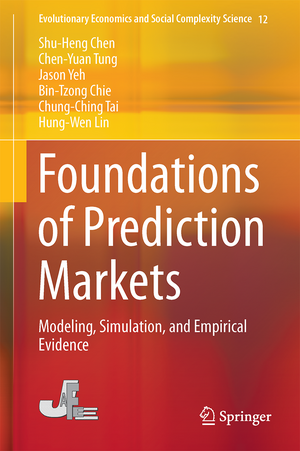Foundations of Prediction Markets: Modeling, Simulation, and Empirical Evidence: Evolutionary Economics and Social Complexity Science, cartea 45
Autor Shu-Heng Chen, Chen-Yuan Tung, Jason Yeh, Bin-Tzong Chie, Chung-Ching Tai, Hung-Wen Linen Limba Engleză Hardback – 13 mar 2025
Din seria Evolutionary Economics and Social Complexity Science
- 18%
 Preț: 792.34 lei
Preț: 792.34 lei - 15%
 Preț: 643.84 lei
Preț: 643.84 lei - 18%
 Preț: 723.21 lei
Preț: 723.21 lei - 18%
 Preț: 742.61 lei
Preț: 742.61 lei - 24%
 Preț: 634.35 lei
Preț: 634.35 lei - 15%
 Preț: 639.08 lei
Preț: 639.08 lei - 18%
 Preț: 730.16 lei
Preț: 730.16 lei - 15%
 Preț: 706.48 lei
Preț: 706.48 lei - 15%
 Preț: 583.61 lei
Preț: 583.61 lei - 18%
 Preț: 784.30 lei
Preț: 784.30 lei - 18%
 Preț: 721.01 lei
Preț: 721.01 lei - 15%
 Preț: 527.15 lei
Preț: 527.15 lei - 15%
 Preț: 644.63 lei
Preț: 644.63 lei - 15%
 Preț: 523.22 lei
Preț: 523.22 lei - 15%
 Preț: 638.24 lei
Preț: 638.24 lei - 18%
 Preț: 728.60 lei
Preț: 728.60 lei -
 Preț: 388.90 lei
Preț: 388.90 lei - 18%
 Preț: 737.26 lei
Preț: 737.26 lei - 15%
 Preț: 696.35 lei
Preț: 696.35 lei - 15%
 Preț: 690.11 lei
Preț: 690.11 lei - 15%
 Preț: 692.24 lei
Preț: 692.24 lei - 18%
 Preț: 1006.24 lei
Preț: 1006.24 lei - 24%
 Preț: 570.15 lei
Preț: 570.15 lei -
 Preț: 388.72 lei
Preț: 388.72 lei - 18%
 Preț: 789.52 lei
Preț: 789.52 lei - 18%
 Preț: 1004.81 lei
Preț: 1004.81 lei - 15%
 Preț: 642.68 lei
Preț: 642.68 lei - 18%
 Preț: 730.65 lei
Preț: 730.65 lei - 18%
 Preț: 729.53 lei
Preț: 729.53 lei - 15%
 Preț: 695.85 lei
Preț: 695.85 lei - 18%
 Preț: 732.52 lei
Preț: 732.52 lei
Preț: 550.32 lei
Preț vechi: 714.76 lei
-23% Nou
Puncte Express: 825
Preț estimativ în valută:
105.30€ • 114.74$ • 88.73£
105.30€ • 114.74$ • 88.73£
Carte nepublicată încă
Doresc să fiu notificat când acest titlu va fi disponibil:
Se trimite...
Preluare comenzi: 021 569.72.76
Specificații
ISBN-13: 9784431552291
ISBN-10: 4431552294
Pagini: 500
Ilustrații: Approx. 500 p. 50 illus., 20 illus. in color.
Dimensiuni: 155 x 235 mm
Ediția:1st ed. 2024
Editura: Springer
Colecția Springer
Seria Evolutionary Economics and Social Complexity Science
Locul publicării:Tokyo, Japan
ISBN-10: 4431552294
Pagini: 500
Ilustrații: Approx. 500 p. 50 illus., 20 illus. in color.
Dimensiuni: 155 x 235 mm
Ediția:1st ed. 2024
Editura: Springer
Colecția Springer
Seria Evolutionary Economics and Social Complexity Science
Locul publicării:Tokyo, Japan
Public țintă
ResearchCuprins
Ch1 Introduction and Overview.- Ch2 Friedrich Hayek and Information Aggregation.- Ch3 Testing Hayek Hypothesis: An Experimental Economic Approach .- Ch4 From Market Experiments to Prediction Markets.- Ch5 Economic Theory of Prediction Markets: A Neo-Classical Approach.- Ch6 Complexity Thinking in Economics: Agent-Based Computational Economics.- Ch7 Agent-Based Modeling of Prediction Markets.- Ch8 Spatial Agent-Based Prediction Markets: Homogeneous Agents.- Ch9 Spatial Agent-Based Prediction Markets: Heterogeneous Agents.- Ch10 Alvin Roth and Market Design.- Ch11 Can We Trust Prediction Markets? .- Ch12 Empirical Study of Prediction Market Performance.- Ch13 Roles of Smart Players in the Markets.- Ch14 Models to Predict Prediction Markets.- Ch15 Conclusions.- Appendix A Exchange of Future Events .- Appendix B NetLogo.
Textul de pe ultima copertă
A prediction market is designed to trade and predict future events. This book provides a comprehensive and multidisciplinary treatment of the prediction market, explaining what it is, how it works, and why it may fail, from the theoretical, computational, and statistical (or machine learning) perspectives. The book begins with the theoretical aspect by reviewing Friedrich Hayek’s work on markets, which he viewed as discovery processes, and proceeds to experimental economics to examine the Hayek hypothesis by using human-subject experiments, finally moving to the modeling work. In addition to the conventional analytical models based on neoclassical economics, agent-based models of prediction markets are introduced. The use of agent-based models makes it possible to address the following four elements, which are difficult to tackle with analytical models: space, networks, traders’ behavior, and market designs. Agent-based simulation of the prediction market augmented with these four elements enables an examination of the effects of these elements on the prediction market from the computational aspect and hence tests the Hayek hypothesis on the basis of diverse institutional and individual characteristics. The empirical part of the book is based mainly on data from xFuture, currently the largest prediction market in Asia. This dataset includes 5.9 million trades from 170,000 members distributed over 128 countries. Forty variables are abstracted from the dataset and categorized into five groups to build empirical models to help evaluate or predict the performance of prediction markets. In addition to the linear models, complex thinking prompts the use of artificial intelligence or machine learning tools to develop nonlinear models. The system thus created allows an examination of how the performance of prediction markets can be affected by the complexity of events, the heterogeneity of agents’ intelligence and beliefs, and the degrees of manipulation.
Caracteristici
Provides a multidisciplinary treatment of prediction markets, including diverse perspectives from mathematical economics, agent-based modeling and simulation, econometrics, and other fields Strengthens the empirical treatment in the book with the utilization of xFuture, a real prediction market Gives a full demonstration of a rising new research field: computational, cognitive, and behavioral social science
